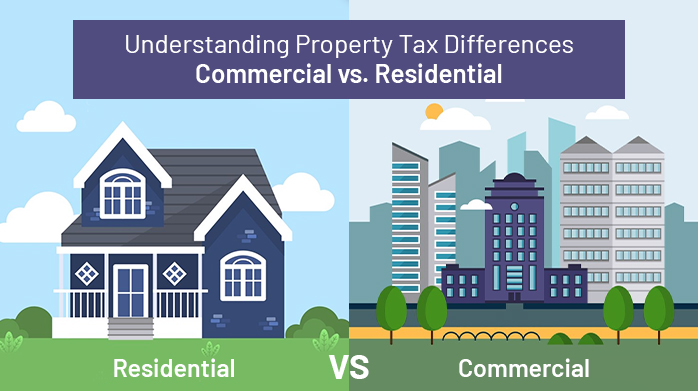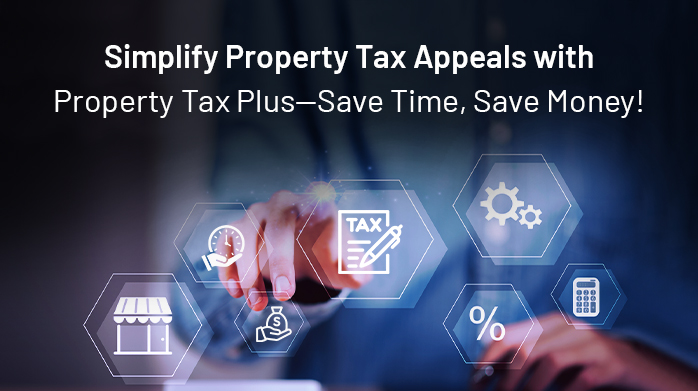Property tax management is a crucial responsibility for property owners, whether they own residential or commercial properties. The approach to managing these taxes, however, varies significantly between the two types of properties. Understanding the differences is essential for property owners, investors, and tax professionals alike. This blog highlights the key distinctions between commercial and residential property tax management within the United States.
1. Valuation Methods
One of the most significant differences between commercial and residential property tax management is the methods used for tax assessment.
Residential Properties: Residential properties are generally assessed based on their market value. This value is determined by comparing the property to similar properties that have recently sold in the area. Factors like location, square footage, and the condition of the property play a significant role in determining the tax assessment. For homeowners, estimating their property’s value can be a straightforward process, often aided by property assessment software.

Commercial Properties: In contrast, commercial properties are valued using more complex methods. These include the income approach, cost approach, and comparable sales approach. The income approach, which estimates the property’s value based on the income it generates, is particularly relevant for commercial properties like office buildings or shopping centers. Due to the complexity of these methods, commercial property tax management often requires the use of specialized property assessment software to accurately assess the property’s value.
2. Tax Rates and Classifications
Tax assessment rates differ between commercial and residential properties, reflecting the distinct nature and use of each property type.
Residential Properties: Residential properties typically benefit from lower tax rates compared to commercial properties. Many states place residential properties in a separate tax bracket, often offering homestead exemptions or other forms of tax relief that reduce the taxable value of the property. This approach is partly due to the societal value placed on homeownership.

Commercial Properties: Conversely, commercial properties are often subject to higher tax assessment rates. This is because commercial properties are viewed as income-generating assets, and taxing authorities recognize their potential to contribute more significantly to local revenues. Additionally, commercial properties may be classified into different categories (e.g., retail, industrial, office space), each with its own tax rate. Commercial property management often involves navigating these classifications and optimizing tax outcomes using the best tax software for tax preparers.
3. Appeals and Disputes
The process of appealing tax assessments can differ significantly between commercial and residential properties.
Residential Properties: For homeowners, the appeals process is generally more straightforward. If a homeowner believes their property has been overvalued, they can file an appeal with their local tax assessor’s office, often without needing legal representation. Property assessment software can aid in this process by providing accurate valuations that homeowners can use to support their appeal.

Commercial Properties: On the other hand, appealing a commercial property tax assessment is often more complex. Due to the higher stakes involved, commercial property owners typically employ legal and tax professionals to handle appeals. The process may involve presenting detailed financial records, income projections, and expert testimony to argue for a lower valuation. The use of the best tax software for tax preparers is often necessary to manage these complex appeals effectively.
4. Impact of Property Type on Tax Management
The type of property—residential or commercial—affects not only how taxes are calculated but also how they are managed over time.
Residential Properties: Homeowners typically manage their property taxes as part of their overall household budget. Tax payments might be made directly to the tax authority or through an escrow account managed by the mortgage lender. Residential property tax management is often less time-consuming and requires less specialized knowledge.

Commercial Properties: Managing taxes on commercial properties is often a more dynamic and ongoing process. It may involve regular reviews of the property’s valuation, proactive tax planning to minimize liability, and, in many cases, strategic appeals. For large commercial properties, dedicated commercial property management teams or property assessment software are often employed to navigate the complexities of tax assessment regulations and ensure that tax obligations are minimized.
5. Regulatory Differences
Finally, regulatory differences between commercial and residential properties also play a significant role in property tax management.
Residential Properties: The regulatory framework for residential properties is generally more stable, with clear guidelines on how properties are assessed and taxed. Homeowners can usually predict their tax obligations with some degree of certainty.
Commercial Properties: In contrast, the regulations governing commercial properties can be more fluid and subject to changes based on local economic conditions, zoning laws, and political pressures. This requires commercial property owners to stay informed and adaptable, often involving significant administrative effort to stay compliant and optimize tax outcomes. The use of property assessment software and the best tax software for tax preparers can be crucial in managing these challenges effectively.

While both commercial and residential property tax management share the common goal of ensuring compliance and minimizing tax liability, the differences in valuation methods, tax rates, appeals processes, and regulatory frameworks make the management of commercial property taxes significantly more complex. Understanding these distinctions is crucial for property owners and tax professionals who want to navigate the property tax landscape effectively.

This is where Property Tax Plus comes into play. Property Tax Plus specializes in providing comprehensive solutions for commercial property tax management, focusing specifically on industries like oil and gas, utilities, transportation, manufacturing, retail, and real estate. By leveraging advanced property assessment software and the best tax software for tax preparers, Property Tax Plus offers tailored services to meet the unique challenges of commercial property owners in these sectors. With their expertise, property owners can ensure they are making informed decisions, optimizing tax outcomes, and achieving better financial results, whether managing a sprawling retail center or a complex utility infrastructure.







